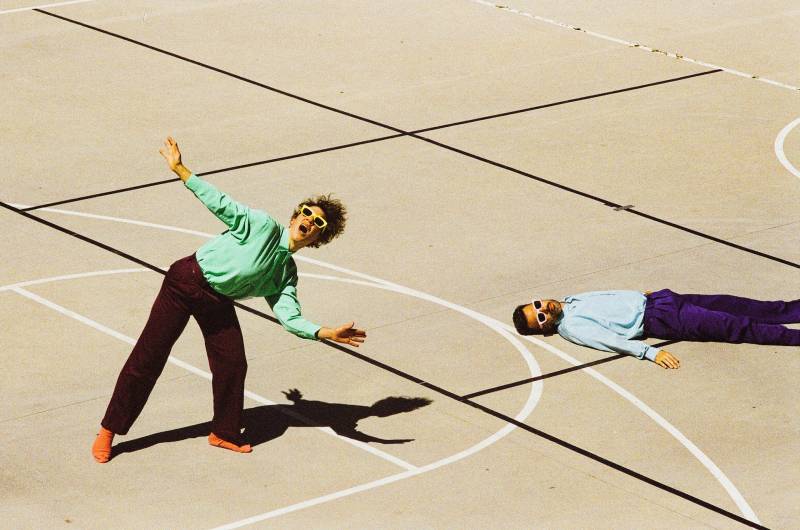“How do you wake up when you don’t even know what the trance is that you’re in?” Garbus says of “hypnotize” in a recent Zoom interview. “This time and the pandemic has given me a ‘fuck it’ attitude about what other people think and doing the self-criticism to the point of paralysis. I feel like when people are suffering and dying, there are a lot of things I feel I owe. And one of those things is to truly live my life and feel alive. So this [album] was really less a concept and more about pleasure.”
Garbus and Brenner recorded sketchy. in their Oakland rehearsal studio. They were between record deals with their label 4AD and relished the lack of pressure from a ticking clock. They wrote and recorded most of the album pre-pandemic, then took a mind-clearing vacation for Garbus’ birthday early last March, just before the coronavirus hit hard. They came back with the realization that if they were going to be hunkered down with no end in sight, they needed to enjoy the process to maintain their sanity.
“We really let ourselves sink into the creativity part of it,” she says. “We've seen how different producers work with stems and after spending months and months with this stuff, we came back at it with a totally fresh perspective, acting as if we were an outside producer coming in.”
The result definitely doesn’t take itself as seriously as I can feel you creeping into my private life, but the rallying cries from Garbus are everywhere. On the choral Afrobeat psychedelia of “silence pt 1 (when we say “we”), she closes with “There’s a secret that I keep, when you think that I am weeping, it’s the future that I shape, the changing and revealing,” paying homage to the behind-the-scenes activists and creatives of color that don’t make it to mainstream discourse. Poignantly, “silence pt 2 (who is “we”?) is just 60 seconds of silence.
Album opener “nowhere, man” sounds like a radio announcement to the masses. Drums pound and vocals loop in the background as the singer sheds the weight of what she says men, from Bob Dylan to Jesus, have told her what a woman is. “If you cannot hear a woman, then how can you write her song?” she asks herself. She says she credits the book Down Girl: The Logic of Misogyny by Kate Manne with illuminating what was holding her back from writing music about her experience as a woman.
“I’ve taken my position in the industry for granted for a while now because I got sick of being on panels of women in music,” she says. “I feel like I have enough respect where I don’t need sound guys telling me how to use a looping pedal. So just like talking about the ways I’m enacting my white woman privilege, it’s the same with misogyny. Here are ways I do to myself what men are doing to me. Here are the ways I’m expecting a very specific woman [from] myself, especially as our culture reckons with our binary sense of gender.”
For an artist whose last record was almost entirely about her own white fragility, it’s hard to fathom that she hadn’t really written about her gender until now, on the fifth Tune-Yards album. But perhaps this delayed rousing of her identity is a product of how and where she grew up. Originally from the suburbs of Connecticut, she went to school in “very white Massachusetts,” then moved to Vermont. From there she lived in an admittedly “white, Anglo enclave” of Montreal before Brenner coaxed her into moving to Oakland with him in 2008.


